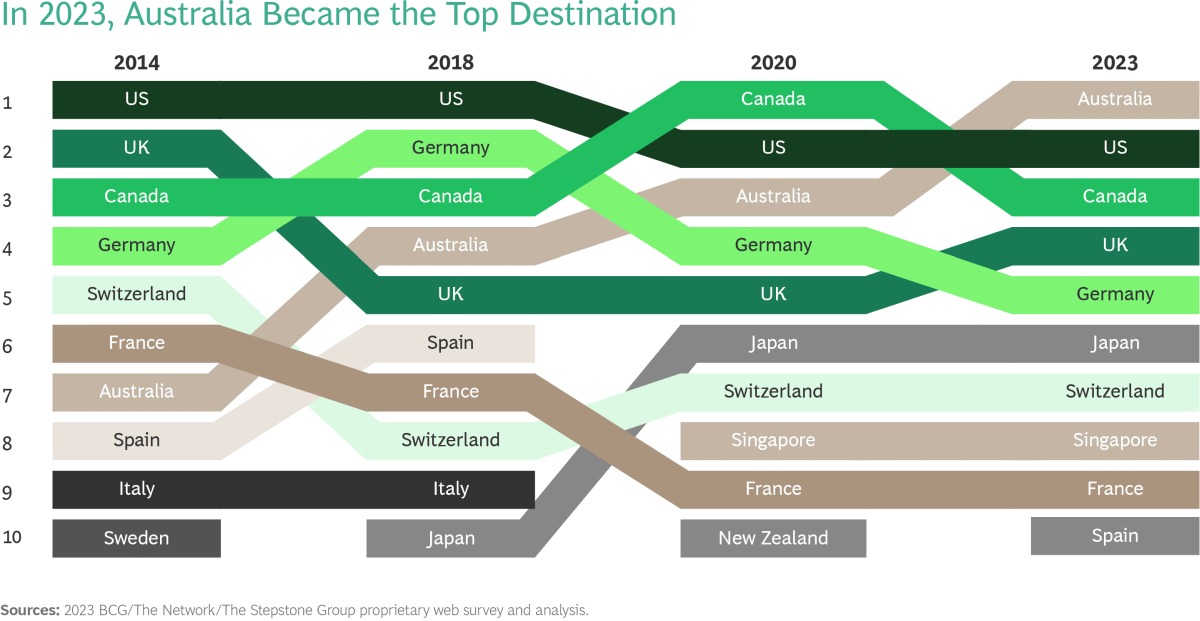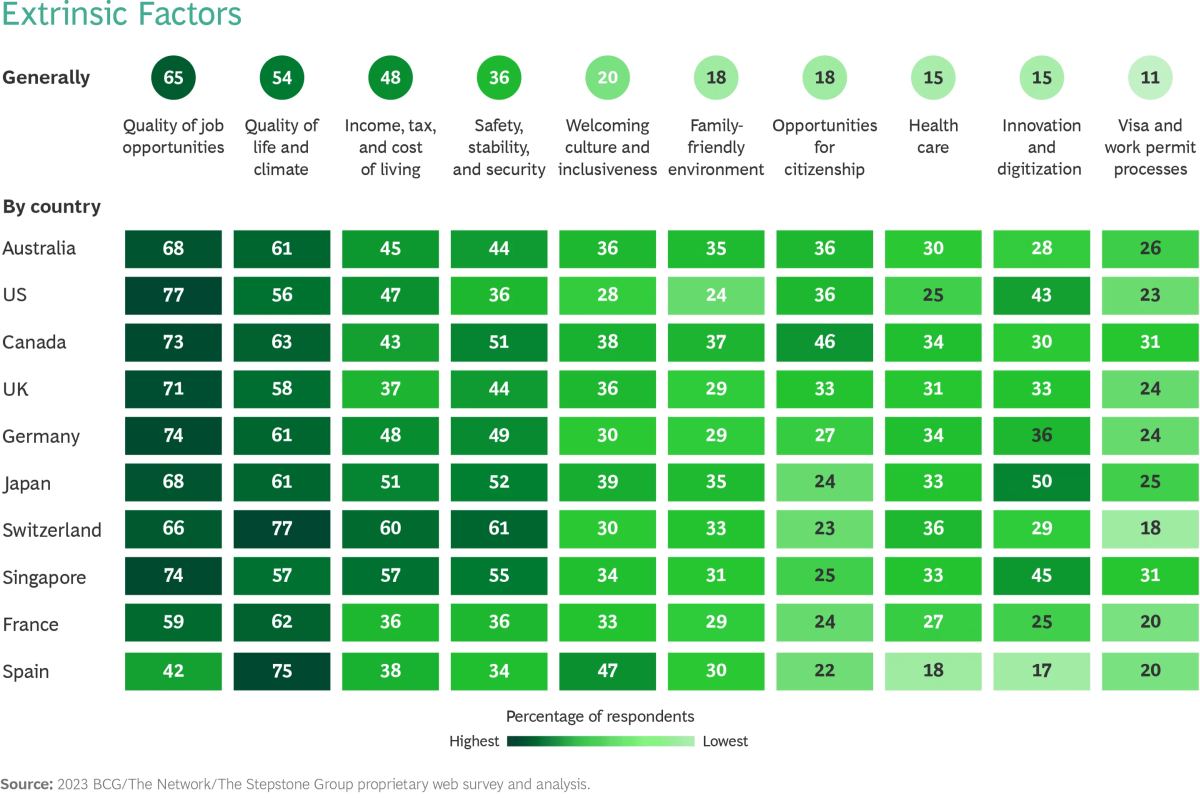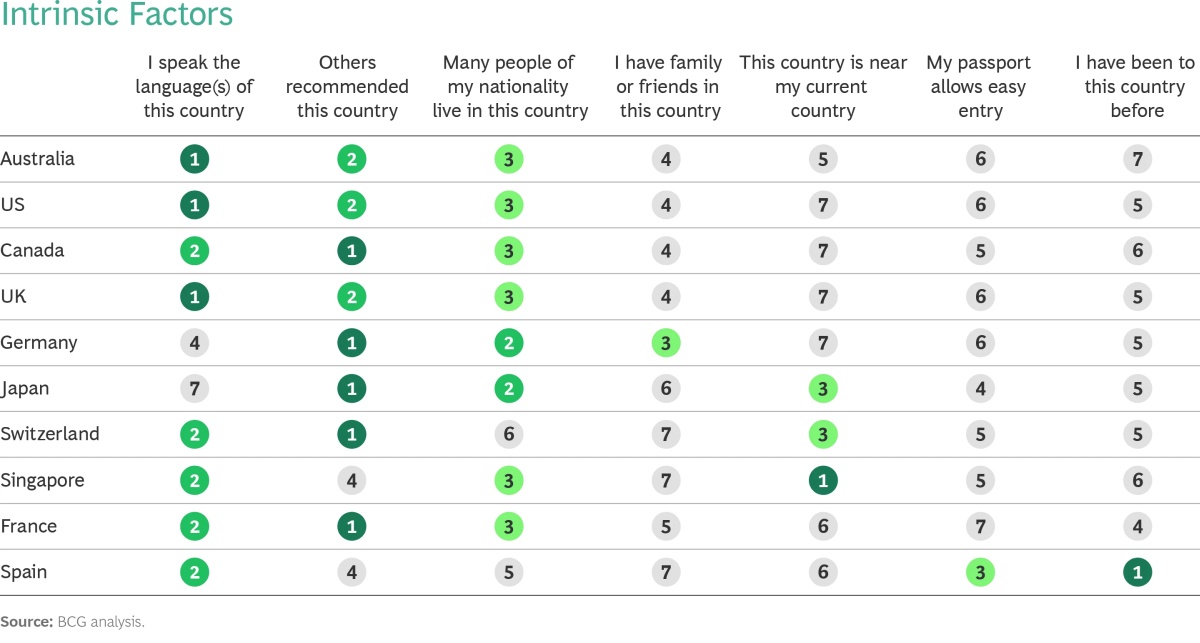Germany takes the top spot among non-English-speaking countries in a worldwide ranking of the most popular international work destinations. Compared to the previous year, however, the country has dropped one place. What stands out notably is that Germans show little inclination to relocate overseas.
This is shown by the international labor market study “Decoding Global Talent” by the digital recruiting platform The Stepstone Group, in collaboration with Boston Consulting Group and The Network. With more than 150,000 employees from more than 180 countries surveyed, including over 14,000 in Germany, the survey is one of the largest of its kind in the world.
The new international leader this year is Australia – ahead of the USA and Canada, the previous winner of the 2020 ranking. Germany relinquishes its fourth place from the previous study to the UK but remains the most popular non-English-speaking country.
In a comparison of major international cities, Berlin remains a magnet for employees worldwide: the capital is in 6th place – behind Abu Dhabi and New York. This year, first place again goes to London, followed by Amsterdam (2nd place) and Dubai (3rd place).

Global mobility of Germans at a low level
According to the study, around a quarter (23%) are currently actively looking for a job outside their home country – despite global challenges such as geopolitical tensions, ongoing inflation, and concerns about recession. And the proportion of those who would be prepared in principle to go abroad for a job is also at a stable high level of 63% worldwide (2020: 66%) – albeit lower than before the coronavirus pandemic (2018: 78%).
However, respondents in Germany are significantly less willing to leave the country for a job: Less than half would want to work abroad and only just under 7 percent are currently actively looking for a job outside Germany.
The top destinations for German respondents are the neighboring countries of Switzerland and Austria, followed by the USA and Spain. In turn, Germany is a particularly attractive destination for people from Bosnia and Herzegovina (32%), Turkey (30%), Pakistan and Hungary (26% each).
A look at the target groups that tend to be more mobile – 20-30-year-olds and people with a university degree – does not paint a significantly different picture here either. While 32% of young people worldwide say they would be willing to move abroad, the figure in Germany is just 10%. And for every 24% of people with a university degree worldwide who are willing to move, the figure in Germany is only 8%.
The most important reasons for emigrating from Germany for work are of a practical nature. For example, 68% of respondents cite financial and economic reasons, 66% expect a better quality of life from the move and 64% follow a specific job offer. In contrast, reasons such as a more inclusive society (13%), environmental aspects (12%) or reuniting with family and friends (12%) play a rather subordinate role.

Germany: Emotional reasons to stay
How can this lack of desire for mobility among German workers be explained? Both German and international respondents stated that by far the most important argument against relocating was not being able to take their partner and/or family with them (Germany: 63%, globally: 54%). Other decisive factors for German workers are
- a strong emotional attachment to their home country (36%),
- security concerns (32 %),
- language barriers (31%) and
- lack of know-how about working abroad (27%).

Attractive jobs and support with the visa process desired
The global study also shows that in most cases, it is the specific job offer that determines whether employees want to go abroad – and less because they associate a particular country with individual benefits. This also applies to Germany: for almost three quarters of respondents (74%), job quality is the reason they choose Germany, while the healthcare system, for example, is only relevant for around a third (34%).
At the same time, 77% expect their future employers to take significant care of the immigration process and support them in applying for visas and work permits, for example.

“Demographic change poses a major challenge for the labor market: we are running out of workers. Without immigration, we will not be able to maintain our prosperity,” says The Stepstone Group labour market expert Dr. Tobias Zimmermann, co-author of the study. “It is a huge opportunity that so many people are keen to move to Germany for a good job. Politics and business should work even more closely together to promote more flexible and faster labor market integration.”
Relocation support: how employers can make a difference
Many international talents are generally willing to come to Germany for the right job. However, when choosing the right employer, almost one in two people (46%) also consider the extent to which the company supports them with relocation and integration on site. According to the workforce study, global talents particularly want
- support in finding accommodation (77%),
- when applying for a visa and work permit (77%),
- with the move itself (66%),
- language acquisition (58%) and
- legal and financial advice (43%).
Those who offer support in these areas give themselves an advantage in terms of attractiveness and are one step ahead in the battle for the best international talent.
“In the competition for workers from abroad, those companies will win that know their future employee requirements and offer talented people attractive working conditions as well as organizational support – for example when applying for work permits. Unfortunately, this is often still very laborious in Germany,” says Jens Baier, Senior Partner at the Boston Consulting Group, and co-author of the study.
Please download the full report here: „Decoding Global Talent”: Dream Destinations and Mobility Trends
About the study “Decoding Global Talent”
BCG, The Network (together with its affiliate organizations), and The Stepstone Group conducted this anonymous, online survey from October through December 2023. All told, 150,735 people in 188 countries participated.
The survey elicited workers’ attitudes on various topics, including their willingness to move abroad for work, the countries they would most like to work in, their reasons for choosing those countries, and their expectations of their future employers in a new country. The data gathered in the survey (including a wide range of information on participants’ demographic and professional backgrounds) made it possible to analyze workers’ attitudes on the basis of multiple parameters.
BCG also conducted follow-up interviews with select study participants around the world—many of whom were interviewed before and have been followed for several years.
Please also read the following post:





